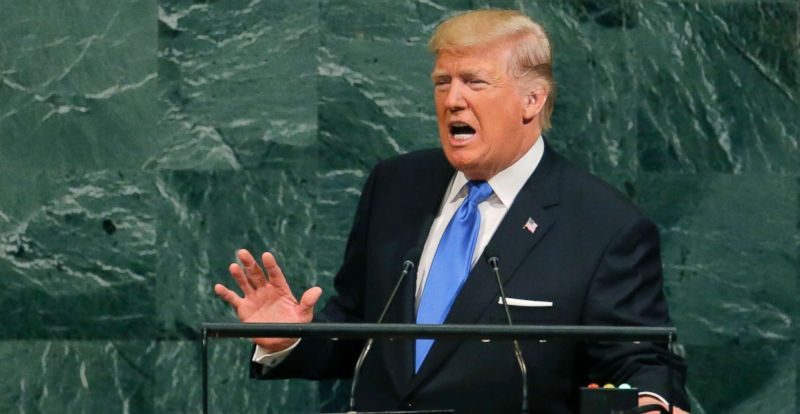The Diplomacy Brief: Trump Refuses to Certify the Iran Deal, An American Approach to Political Islam, Prime Minister Jeremy Corbyn? and The EU’s trouble with Catalonia
A Wedge In International Relations as US-Iran Bicker it Out
President Trump is expected to refuse to recertify Iran’s compliance with the Joint Comprehensive Plan of Action (J.C.P.O.A) – a nuclear deal reached in 2015 between Iran and the five permanent members of the U.N. Security Council plus Germany. It was hoped that through this historic multilateral agreement, Tehran would be restrained from acquiring nuclear capability, and reintegrate with the international community as a responsible member.
Recertification is not required by the agreement, which holds the International Atomic Energy Agency (IAEA) as the sole authority for verifying Iran’s compliance. Opponents of the deal in Washington D.C. accused President Obama of excessive compromise and passed a law through Congress, which requires the U.S. President to certify every 90 days if Iran is keeping up with its end of the deal.
U.S. President Donald Trump has already certified Iran’s compliance with the deal twice before in 2017: first in April and then in July. After numerous inspections, the IAEA has produced eight reports confirming Iran’s commitment to the nuclear agreement. Nevertheless, with October 15th quickly approaching, it is being reported that President Trump will refuse to recertify Iran’s compliance – a move that could be further harmful if Congress chooses to impose additional sanctions on Iran that violate the deal.
One of the possible sanctions President Trump is currently considering involves targeting Iran’s Revolutionary Guard Corps. If this happens, it would be the first time since the 1979 Islamic Revolution that Iran’s military has faced sanctions. So far, only entities and individuals affiliated to the Guards have been the target of international sanctions. By targeting sanctions on the Guards themselves, the U.S. President will send a clear message to the Iranian government – its foreign policy choices in the Middle East are no longer acceptable to the U.S. This includes Iran’s support for Hezbollah, Bashar-al-Assad’s government in Syria and fueling the civil-conflict in Yemen.
In a backlash against the U.S. President, the elite force in Iran, has threatened retaliation on American army and bases in the Middle East – which could potentially stir up more chaos in the region, considering Iran’s central role in regional politics. On the other hand, the U.S. President’s refusal to recertify the nuclear deal would endanger U.S. legitimacy in the international arena by demonstrating a less than fully committed America to world peace and security.
The larger question remains: What does the U.S. hope to gain from viewing the nuclear deal as a zero-sum game, and retreating from a multilateral commitment? The answers are not always apparent.
Opinions on US-Iran Relations:
- The Financial Times analyzes the result of President Trump’s decision to impose sanctions on Iran’s Revolutionary Guard from a security aspect. The article highlights Iran’s right to “conventional defensive, missile and regional programs” which do not violate the J.C.P.A.
- Shafik Mandhai, of Al-Jazeera argues from a regional and international perspective on the U.S. President’s refusal to recertify the Iran nuclear deal. According to Mandhai, Trump’s combative approach towards the deal could potentially hurt European allies political and commercial ties with Iran.
- Wendy Sherman, of the New York Times argues against Trump’s rhetoric on Iran, ceding that any volatility in U.S. decision-making towards Iran and multilateral partnerships, could potentially hamper U.S. credibility in the international arena, marking them an untrustworthy ally. According to Sherman, appearances and perspectives are the sole guarantors of safety and security in the international arena. The author also argues that if the U.S. loses face in the international community following President Trump’s refusal to recertify the deal, future negotiations and settlements with North Korea vis-e-vis China will be next to impossible.
- Gholamali Khoshroo, Iran’s Ambassador to the United Nations, writes in an op-ed piece to the New York Times clarifying the many misleading assumptions on the Iran nuclear deal. According to the Ambassador, the Iran nuclear deal has been politicized in the domestic realm of the U.S. based on 4 main false assumptions. However, the Ambassador ascertains audience at the end, that Iran will continue to oblige with its commitment to the international community, with or without U.S. support
What we are Reading in IR
- Writing in the Atlantic, Shadi Hamid, William McCants, and Peter Mandaville, discusses How America Changed Its Approach to Political Islam. McCants and Hamid, who have just released a Book on Political Islam titled Rethinking Political Islam, recount the US’s past support for Islamists as a counterweight to Arab Socialism and its turn towards a more antagonistic relationship after the end of the Cold War. The rhetoric of the current administration is extremely skeptical of the legitimacy of any Islamist movement, but Hamid Et al are correct when they say that even in the wreckage of the Arab Spring, the Islamists aren’t going anywhere.
- Rachel Shabi writing in the New York Times, declares that the UK should Get Ready for Prime Minister Jeremy Corbyn. Shabi writes that current polling suggests that if an election were held now Mr. Corbyn would be heading to Downing Street. This change of events has catapulted what was once the fringe to power, with Mr. Corbyn himself saying that their positions are now “mainstream.”
- Natalie Nougayrède writing in the Guardian argues that The EU has tied its own hands. It cannot intervene in Catalonia. Nougayrède writes that the Catalonian Crisis has exposed the inherent contradictions between its values on democracy and human rights alongside its respect for the internal sovereignty of nations.
Compiled by Zehra Khan

